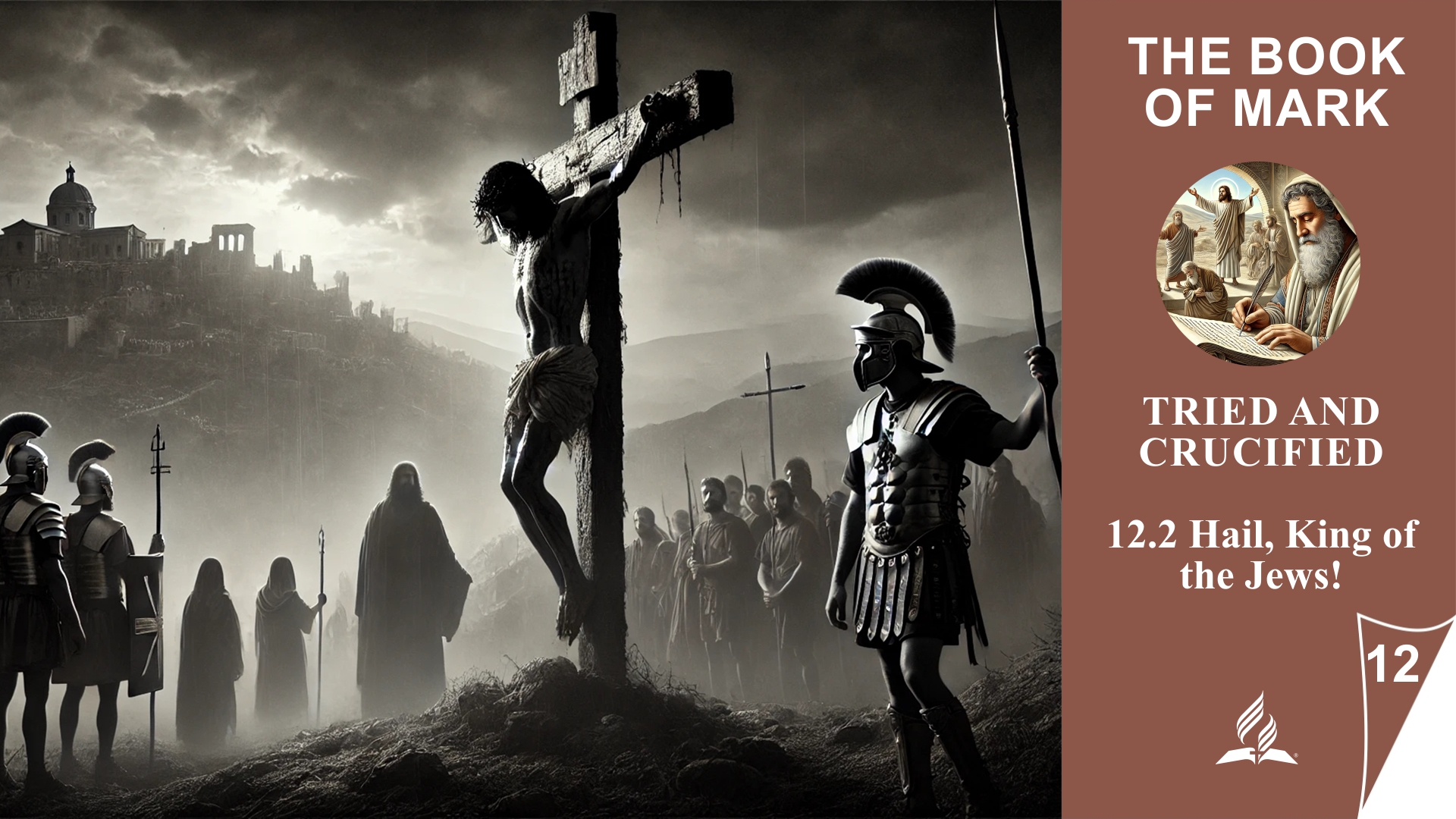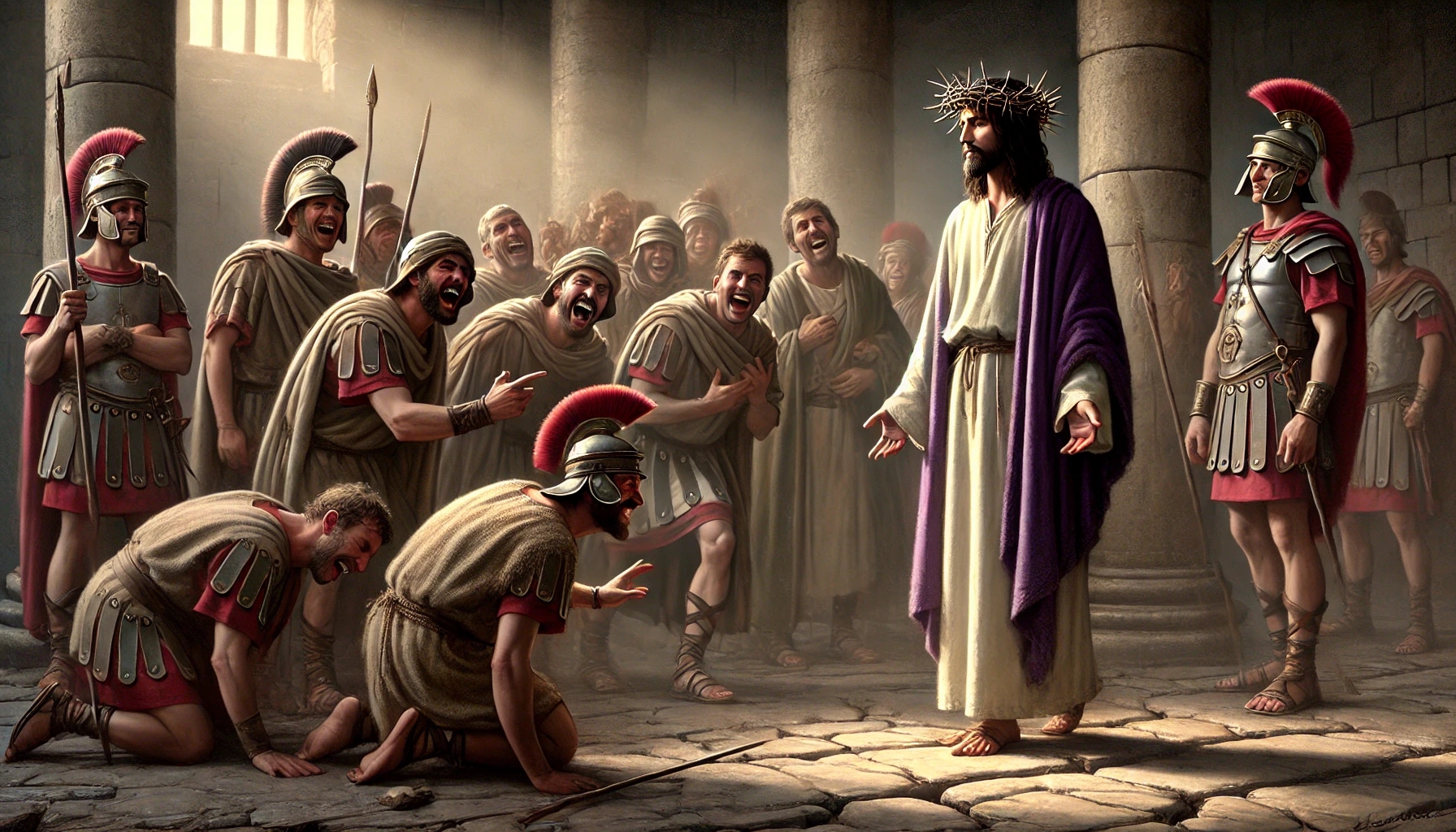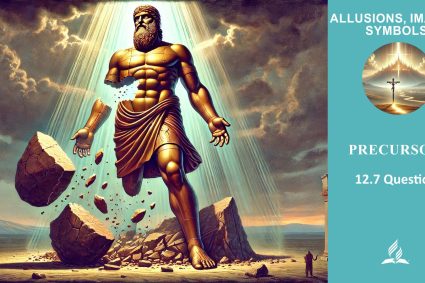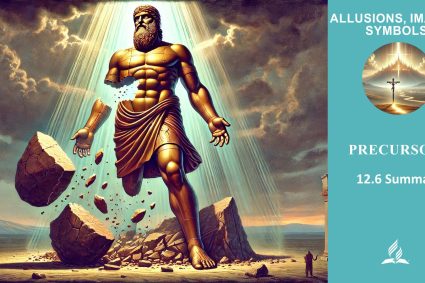


12.2 Hail, King of the Jews!
The Mocked Royal Dignity: Mockery and Deep Truth in the Ridicule of Jesus
Read Mark 15:15–20. What did the soldiers do to Jesus and what is the significance of this?
In Mark 15:15–20, we witness a scene of brutal humiliation and mockery, where the Roman soldiers ridicule Jesus as the “King of the Jews.” After He had already been brutally mistreated through flogging, the soldiers continued His suffering by mocking Him with symbols of royal power—a purple cloak, a crown of thorns, and a mocking homage. These actions are a bitter parody of the Roman practice of honoring the emperor and reveal the cruel irony that the soldiers who intended to humiliate Jesus inadvertently affirmed His true identity as King.
-
The Significance of the Mocking Crown and Purple Cloak
The crown of thorns and the purple cloak, symbols of royal authority, were used to mock Jesus. However, for the readers, the irony becomes clear: while the soldiers were ridiculing Jesus, He was actually bearing the royal dignity that surpasses any earthly kingship. Jesus is not only the King of the Jews but the King of all humanity, who through His impending crucifixion will establish the Kingdom of God.
-
The Repeated Mockery
The Greek use of the imperfect tense, which describes a repeated action, highlights the ongoing and systematic humiliation of Jesus. The soldiers struck Him repeatedly, spat on Him repeatedly, and mockingly knelt before Him. These repetitive actions demonstrate the complete disregard and dehumanizing mockery that Jesus endured—all in silence. Jesus’ silence underscores His royal composure and the fulfillment of His divine mission.
-
The Deep Irony
The deepest irony lies in the fact that Jesus, who was mocked as a king, was indeed the true King. The soldiers did not recognize the truth they were speaking. While they humiliated and dehumanized Jesus, they unknowingly fulfilled God’s plan: through these sufferings and the forthcoming crucifixion, Jesus would redeem the world. His true kingship, which the soldiers could not recognize, is ultimately revealed in His resurrection.
-
The Fulfillment of the Prophetic Suffering
The silent endurance of these cruelties is directly related to the prophetic scriptures that predict the suffering Messiah. He takes on the pains and mockery not only as a sacrifice but as a sovereign ruler who will triumph through suffering and death. The soldiers, who thought they had control, were actually instruments in a divine plan that far exceeded their power.
Conclusion
This scene in Mark 15:15–20 illustrates the bitter irony that Jesus is mocked as a king, even though He is the true King. It shows that worldly power and recognition often do not align with divine truth. Jesus’ silence and patience amidst mockery and suffering reveal His true royal dignity and the fulfillment of His redemptive work, which will be fully unveiled in the forthcoming resurrection.
These men did not know what they were doing. But why will their ignorance not excuse them on the day of judgment?
The ignorance of the men who mocked and mistreated Jesus will not excuse them on the day of judgment because ignorance alone does not absolve one from moral wrongdoing. There are several theological and moral reasons why their ignorance does not fully exonerate them:
-
Basic Moral Knowledge:
Every person, regardless of their religious or cultural background, possesses a certain level of moral awareness. It is generally recognized that mistreatment, cruelty, and mockery towards others are wrong. Even if the soldiers did not fully understand who Jesus was, they still had the capacity to recognize that their actions were inhumane and cruel.
-
Responsibility for Actions:
In the Christian faith, people are responsible for their actions even if they do not fully comprehend their meaning or consequences. The soldiers were part of a brutal system of violence and could have resisted these immoral orders. Their ignorance about Jesus’ true identity might be a mitigating factor, but it does not release them from responsibility for the suffering they knowingly caused.
-
Jesus’ Words on the Cross:
Jesus Himself said on the cross, “Father, forgive them, for they do not know what they are doing” (Luke 23:34). These words show that Jesus understood their ignorance and was willing to offer forgiveness. However, forgiveness requires repentance and a change of heart. Even if they did not know that Jesus was the Messiah, they had the opportunity to repent for their immoral actions and seek forgiveness.
-
Sin and Ignorance:
In the Christian understanding, sin is not only about conscious wrongdoing but also about failing to seek truth or closing one’s heart to the truth. Ignorance can thus be self-imposed, especially when people are unwilling to take moral responsibility for their actions or to open themselves to the truth, even when it is pointed out to them.
-
The Principle of Judgment:
On the day of judgment, as taught in the Christian faith, every person will account for their deeds. God’s justice considers all circumstances, including ignorance and the opportunity for repentance. Nevertheless, everyone remains responsible for their own moral stance. The soldiers had the opportunity to question their consciences and show compassion but chose not to.
Conclusion:
Ignorance alone does not shield one from moral responsibility. Even if the soldiers did not know they were mocking the Messiah, they were still responsible for their cruel actions. However, the Christian faith emphasizes that God’s grace and forgiveness are available to all who repent and turn back—even those who acted out of ignorance.
The connection between the scene in Mark 15:15–20 and our everyday lives as well as our faith lies in the question of how we respond to injustice, mockery, and pressure, and how we recognize true dignity amidst suffering.
-
Mockery and Misunderstanding in Daily Life:
Just as Jesus was mocked and misunderstood by the soldiers, we too may encounter rejection, mockery, or misunderstandings in our daily lives, especially concerning our faith or values. The soldiers thought they were mocking a false king, but in reality, they were mocking the true ruler. Similarly, we often find that our deepest convictions are not recognized or respected by others. In such moments, faith calls us to remain patient and dignified, as Jesus did.
-
Enduring Suffering and Injustice:
Jesus’ behavior under suffering and mockery shows how to maintain dignity and inner peace even in great distress. In our lives, we sometimes face injustice or personal suffering. Jesus’ example teaches us that suffering is not the end but can be part of a larger plan. Our faith helps us to keep hope during difficult times and to trust that ultimately, justice and redemption will prevail.
-
The Power of Forgiveness:
Jesus’ words, “Father, forgive them, for they do not know what they are doing” (Luke 23:34), remind us that we should grant forgiveness even in moments of great hurt and injustice. In everyday life, we are often tempted to respond to wrongdoing with resentment or revenge. However, faith teaches us that forgiveness is not only an act of mercy but also an act of inner strength and a key to our own liberation.
-
The Irony of Life:
The deepest irony in this story is that while Jesus was being mocked, He was truly the King. This irony shows us that outward reality often contradicts what is actually happening. In our lives, true values—such as love, justice, and faith—are often invisible to the world or not immediately recognizable. Faith calls us to look beyond the visible and to discern the deeper truths that are often hidden.
-
The Temptation to Be Part of the Crowd:
The soldiers mocked Jesus because they were part of a system of violence and abuse of power. This scene reminds us how easy it is to follow the crowd and perform actions blindly without questioning their moral consequences. In our daily lives, we might ask ourselves whether we sometimes follow the majority out of convenience or fear of rejection, even when we know it is wrong. Faith calls us to act courageously and stand against injustice, even if it means going against the current.
Conclusion:
The scene in which Jesus is mocked challenges us to recognize true dignity and truth in our daily lives, even when they are misunderstood or ridiculed by others. Faith gives us the strength to remain steadfast in difficult times, practice forgiveness, and not be led by the crowd or the superficiality of the world. Jesus’ suffering and His royal patience serve as a model for how we can preserve our inner dignity and faith amidst injustice and mockery.

True greatness is often not shown in power, but in the quiet dignity with which one endures suffering and injustice.
(Visited 17 times, 1 visits today)





















